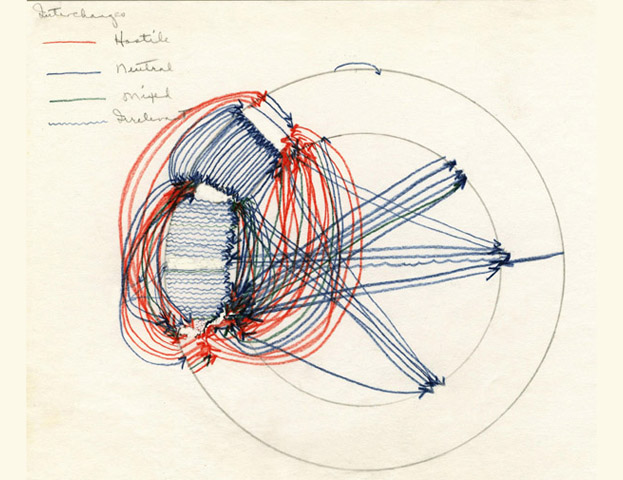Family Relationships
“…[T]he triangle between self and parents… is the most important primary triangle in life, and the one in which a person develops the triangle relationship patterns that remain relatively fixed in all relationships.”
“The child is ‘programmed’ into the emotional configuration [of the family] very early in life, following which the amount of unresolved emotional attachment remains relatively fixed except for functional shifts in the parents.”
If there is one thing that is almost universal in Marriages, it is the WISH FOR HAPPINESS and the EFFORT TO MAKE THE OTHER HAPPY. The more mature the people, the less the concern with HAPPINESS. The more immature the people, the more they get preoccupied with HAPPINESS. This is most striking in the least mature people. The best example of this I’ve seen was a couple who “felt” (It is very hard for some people to operate on beliefs instead of feelings) that the ideal marriage would be one in which each could “give self to the other completely.” What a mess of a marriage they had!
In my opinion, HAPPINESS, AS A GOAL, IS UNATTAINABLE. It appears to work for a lot of us, in a half successful kind of way, but the showdown comes with the test case situation. It is NEVER POSSIBLE TO SUCCEED IN MAKING THE OTHER HAPPY because SELF CAN NEVER DETERMINE WHEN HE HAS SUCCEEDED. Only the other can determine when your effort has been successful. For most of us, we make an effort to please the other and the other, sensing our effort, ACTS pleased without bothering his head to KNOW whether he was pleased or not. Life goes on as a grand delusion with no need to be especially concerned about it.
Sometimes it is hard to find a “head of the clan.” Families will insist that they are big democracies, etc. and that they do not have such a person. However at times of crisis such as serious illness, or death, or court actions, a single person will step forward and become responsible and he, without knowing it, is head of the clan. Another way to find him is to find out who is, or who would be appointed Executor of an estate.
If parents are able to change themselves, and this can be a lifelong preoccupation and effort, then the changes will automatically be reflected in their children. If parents attempt to change the child, without bothering to change themselves, and this is one of the most predominant and predictable characteristics of our culture, they will emerge with a change that is more apparent than real, which will last for one generation at best. A common phenomenon in our culture is one in which parents will say, “I want my children to have a better lot in life than I had. I do not want them to have to go through the problems and difficulties I had with my parents in my childhood.” So the parents make a concerted effort to correct what they FELT (there is a big distinction between what one feels to be right and what one believes to be right) was wrong in their childhood in the rearing of their children. The coin is turned over and on the surface appears to be different, but the problem remains the same. Their children, involved in the same problem but with different manifestations, resolve to make things better for their children and to not repeat the mistakes of their parents. Again comes another change of the coin in the third generation with the net result that the member of the third generation can come to have the exact characteristics that the parents (second generation) disliked so much in their parents (first generation).
For many years I have been on the thesis that a person can neither “hate” nor “over-revere” a parent if they really know their parents. I don’t ride long with people who profess “hate” for parents. I insist that if you really get to know a parent as a person instead of an “angel” or a “devil,” then you cannot either hate or sanctify them…. How can you really “hate” someone you’ve never really known? Do you know what your mother was going through at the time you were born? Well why in the world didn’t you ever ask or try to find out? Do you make it a policy of “hating” people without really knowing facts?

Sociogram showing interchanges that are hostile, neutral, mixed and irrelevant. A nurse on the project, Ethel Mosby, probably created this drawing as directed by Dr. Bowen. Staff did this type of recording at the family-staff meetings, n.d. Courtesy of the National Library of Medicine.
